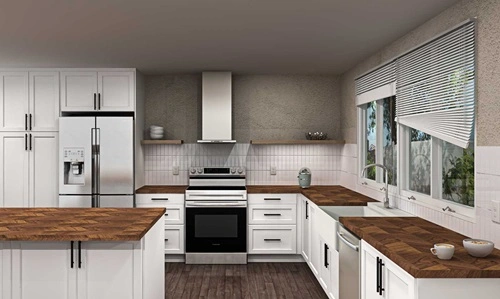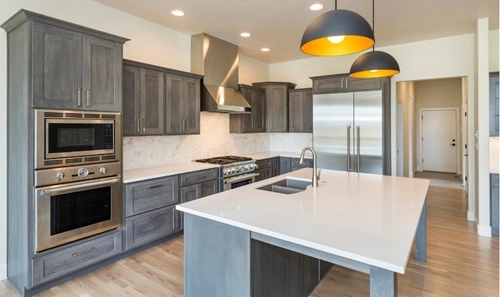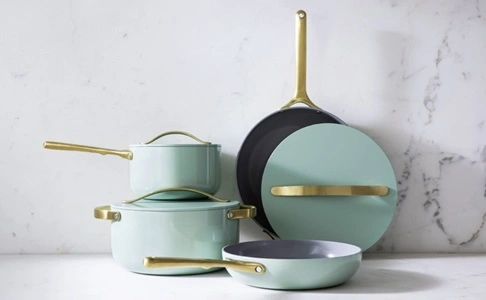When it comes to countertop materials, butcher block countertops stand out for their warm, natural aesthetic and timeless appeal. Often made from solid wood such as maple, oak, or walnut, butcher block countertops offer a unique combination of functionality and beauty. However, as with any material, they have their strengths and weaknesses.
This article explores the pros and cons of butcher block countertops, helping you decide if this material is the right fit for your kitchen or workspace.
What Are Butcher Block Countertops?

Butcher block countertops are made by gluing together strips of wood to form a sturdy, flat surface. They are available in three main styles:
- Edge Grain: Features long strips of wood with narrow edges exposed, creating a smooth and uniform surface.
- End Grain: Composed of small square pieces of wood, end grain surfaces are more durable and often feature unique checkerboard patterns.
- Face Grain: Showcases the broad surface of the wood, emphasizing the natural grain and patterns, but is less durable than the other types.
These countertops are valued for their versatility and are used in a range of settings, from rustic farmhouse kitchens to sleek modern designs.
The Pros of Butcher Block Countertops
1. Natural Aesthetic
One of the most significant advantages of butcher block countertops is their natural beauty. The warmth and texture of wood create a welcoming atmosphere, making them a favorite for those seeking a cozy, homey kitchen or workspace.
2. Versatility in Design
Butcher block countertops come in various wood types, finishes, and stains, allowing them to complement a wide range of styles. Whether you prefer a rustic farmhouse look, a Scandinavian-inspired design, or a sleek modern aesthetic, butcher block can adapt to your vision.
3. Durability
When properly maintained, butcher block countertops are highly durable and can last for decades. End grain butcher blocks, in particular, are resistant to knife marks and wear, making them ideal for heavy-duty use.
4. Repairability
Unlike materials such as granite or quartz, wood can be easily repaired. Scratches, dents, and stains can often be sanded out, restoring the surface to its original beauty. This makes butcher block countertops a practical option for high-traffic kitchens.
5. Cost-Effectiveness
Butcher block countertops are more affordable than many other premium materials like quartz or marble. While prices vary depending on the type of wood and construction, they are generally budget-friendly and offer excellent value for money.
6. Eco-Friendly Option
Wood is a renewable resource, and sustainably harvested butcher block countertops are an environmentally friendly choice. Many manufacturers use wood certified by organizations like the Forest Stewardship Council (FSC), ensuring responsible sourcing practices.
7. Gentle on Dishes
Unlike harder materials such as stone or tile, butcher block countertops are softer, reducing the likelihood of breaking dishes if they are dropped on the surface.
8. Easy to Work With
Wood is a forgiving material, making it easy to cut or customize butcher block countertops during installation. This is especially helpful for irregularly shaped spaces or DIY projects.
9. Safe for Food Preparation
Butcher block countertops, particularly those made from end grain wood, are suitable for direct food preparation, such as chopping and cutting. With proper sealing and maintenance, they can remain a sanitary surface for kitchen tasks.
10. Warm to the Touch
Unlike cold stone surfaces, wood retains a warm and inviting feel, making butcher block countertops comfortable to work on, especially in colder climates.
The Cons of Butcher Block Countertops
1. High Maintenance Requirements
Butcher block countertops require regular maintenance to keep them in good condition. This includes frequent oiling to protect the wood and sealing to prevent water absorption and stains. Neglecting maintenance can lead to cracks, warping, or discoloration.
2. Susceptibility to Water Damage
Wood is porous and can absorb water if not properly sealed, leading to swelling, warping, or mold growth. This makes butcher block countertops less ideal for areas prone to moisture, such as around sinks.
3. Vulnerability to Scratches and Stains
While scratches and stains can be repaired, they are more common with butcher block countertops than with harder materials. Sharp knives, hot pots, and acidic foods can leave marks or damage the surface if not handled carefully.
4. Not Heat-Resistant
Wood is not heat-resistant, and placing hot pots or pans directly on the surface can scorch or discolor the countertop. Homeowners must use trivets or heat pads to protect the wood from damage.
5. Limited Color Options
Unlike stone or engineered materials, wood has a more limited range of colors. While it can be stained or painted to achieve different looks, the options are not as diverse as those offered by materials like quartz or laminate.
6. Prone to Bacterial Growth
If not properly sealed and maintained, butcher block countertops can harbor bacteria in their porous surface. Regular cleaning and sealing are necessary to ensure a sanitary environment for food preparation.
7. Shorter Lifespan Without Maintenance
Without consistent care, butcher block countertops may wear out faster than more durable materials like stone or quartz. They require ongoing attention to preserve their appearance and functionality.
8. Easily Damaged by Harsh Cleaners
Strong chemical cleaners or abrasive scrubbing pads can damage the wood’s finish or surface. Homeowners must use gentle cleaning solutions and soft cloths to maintain the countertop.
9. May Develop Patina Over Time
While some homeowners appreciate the natural patina that develops on butcher block countertops, others may see it as a drawback. The surface may darken, stain, or show signs of wear over time, which could affect its appearance.
10. Installation Challenges
Although wood is easy to cut and shape, proper installation requires careful sealing and leveling. Improper installation can lead to gaps, uneven surfaces, or water damage.
Who Should Consider Butcher Block Countertops?
Butcher block countertops are an excellent choice for:
- Homeowners who value a natural, warm aesthetic.
- Those looking for an affordable yet stylish countertop material.
- People willing to commit to regular maintenance to preserve the wood’s beauty and functionality.
- DIY enthusiasts or those who want a customizable option for unique spaces.
- Eco-conscious individuals who prioritize sustainable materials.
However, they may not be ideal for homeowners who prefer low-maintenance surfaces or those in environments prone to high humidity or moisture.
Tips for Maintaining Butcher Block Countertops
- Oil Regularly: Use food-safe mineral oil to condition the wood and protect it from drying out.
- Seal the Surface: Apply a wood sealer to prevent water absorption and stains.
- Clean Gently: Use mild soap and water for daily cleaning, and avoid harsh chemicals.
- Address Spills Immediately: Wipe up spills quickly to prevent water damage or staining.
- Use Cutting Boards: Protect the countertop from scratches and knife marks by using cutting boards.
- Avoid Direct Heat: Always use trivets or heat pads under hot pots and pans.
- Sand Out Damage: Minor scratches, dents, or stains can often be sanded away and refinished.
Conclusion
Butcher block countertops offer a timeless, natural charm that can elevate the look and feel of any kitchen or workspace. Their affordability, versatility, and repairability make them a practical choice for many homeowners. However, they require regular maintenance and care to protect against water damage, stains, and scratches.
By weighing the pros and cons of butcher block countertops, you can determine whether this material aligns with your lifestyle, budget, and aesthetic preferences. With proper care and attention, butcher block countertops can provide a beautiful and functional surface for years to come.



